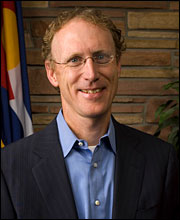
As we reported on Thursday, the Obama administration has scooped up Shaun McGrath, the green mayor of Boulder, Colo., to serve as the deputy director of intergovernmental affairs within the White House.
McGrath has been mayor of Boulder since 2007 and a city council member since 2003. He has also worked on environmental issues for the Western Governors’ Association since 1995. It was under his leadership that Boulder set out to become the first smart-grid city in the country. Voters there also approved the country’s first carbon tax in 2006, and the city has been recognized with a platinum-level “bicycle-friendly community” award from the League of American Bicyclists. Pretty frickin’ green, eh?
We tracked McGrath down to find out what he’ll be doing in his new gig, which starts on Feb. 9.
Grist: What exactly will your role be in the White House?
Shaun McGrath: It’s in the White House Office of Intergovernmental Affairs. The office is the president’s liaison to state and local elected officials, and I will be the deputy director responsible for liaising between the president and the nation’s governors.
Grist: You’ve been active on green issues in Boulder. What do you hope to be able to do with that experience in your new role at the White House?
McGrath: Well, first I should say that I’ll be working on the president’s priorities and his agenda, and that could cover the gambit of issues. That said, he has clearly pointed to energy issues and climate change as being very important to his administration, so I expect that would possibly be an area that I could be involved in, particularly since those are issues that are very important to the governors as well.
Grist: A lot of the significant work we’ve seen on climate and energy has been coming from municipalities, mayors, and governors. What do you think you’ll bring to this position from your experience working with governors and as mayor?
McGrath: In Boulder we have been looking at how to reduce our climate emissions for a while now, and we adopted a Climate Action Plan a few years back, and passed a carbon tax to help pay for programs to meet that goal. So we’ve had some experience there that may be somewhat ahead of where others are and may be something that I can bring to the discussion when it comes up.
Boulder is also becoming the first smart-grid city in the world, actually, which has of course modernized the way we provide and consume energy. And that is something that the president has also identified as a priority in his energy plans.
Grist: Nationally, what do you think should be the priorities in getting smart-grid programs kicked off?
McGrath: I think what is important is to really invest in the infrastructure that’s going to be needed to put in smart meters, to put in the different equipment that’s needed to have the two-way communication between the utility and the homeowner or business, the consumer of the energy.
But there’s also a need for education. For smart grid to be successful, it’s really going to take behavioral change at some level, so I think it’s important to remember that the education component should be part of it.
Grist: Through the Western Governors’ Association, you’ve worked with governors on their state priorities. This week we saw progress on one of those state priorities with President Obama’s order that the EPA reconsider whether California should get a waiver to set tough auto-emissions standards. What are some of the things you think should be done at the federal level to support state initiatives?
McGrath: The president has made some strong overtures to state and local governments, that he really does see the importance of partnerships with state and local governments, and he is already putting that in action. I find it very encouraging that the president really wants to reach out to governors and mayors and figure out what their needs are on a regional level, because clearly the needs of the Western states are different from the needs of the Southern and Eastern states in some cases. I think this is very important for the country.
Grist: What are some of the experiences you’ve had in Boulder that you hope will be influential in your work at the federal level?
McGrath: Well, I’m going back there to work for the president, so I’m not coming into the office trying to replicate Boulder’s successes nationally. But I certainly will … I’ll just leave it at that.


